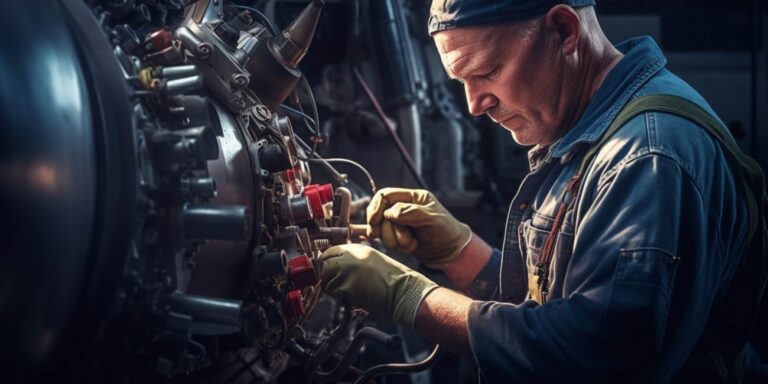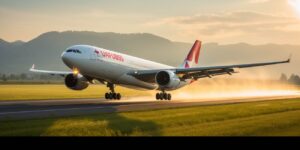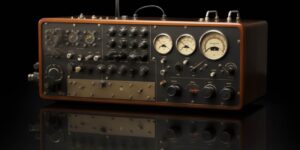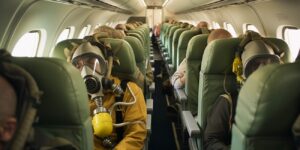The FAA’s rigorous process for licensing aircraft mechanics involves a combination of practical experience, educational requirements, and successful completion of written and oral exams. These measures are in place to guarantee that those entrusted with the maintenance of aircraft possess the expertise required to uphold the highest standards of safety in aviation.
Prospective aircraft mechanics typically undergo specialized training programs, either through FAA-approved schools or through hands-on experience gained through apprenticeships. These programs cover a wide range of topics, from mechanical systems and avionics to safety protocols and regulatory compliance.
Once the training is complete, candidates must accumulate a specified number of practical experience hours, working under the supervision of licensed aircraft mechanics. This hands-on experience is crucial in honing their skills and ensuring a comprehensive understanding of the complexities involved in aircraft maintenance.
The FAA’s licensing process extends to different categories of aircraft mechanics, including airframe mechanics and powerplant mechanics. This comprehensive approach ensures that professionals are equipped to handle various aspects of aircraft maintenance, contributing to an overall enhancement of aviation safety.
It’s worth noting that the FAA regularly updates its licensing requirements and standards to align with advancements in aviation technology and evolving safety considerations. This commitment to staying at the forefront of industry changes reinforces the FAA’s role as a cornerstone in maintaining the safety and integrity of the aviation sector.
Faa responsible for licensing aircraft mechanics and technicians
The Federal Aviation Administration (FAA) plays a crucial role in ensuring the safety and reliability of aircraft, and part of its responsibility involves licensing aircraft mechanics and technicians. These professionals are the backbone of aviation maintenance, and their expertise is essential for keeping aircraft in optimal condition.
The process of licensing aircraft mechanics is rigorous and designed to ensure that individuals possess the necessary skills and knowledge to perform critical maintenance tasks. The FAA sets strict standards for licensing, covering a wide range of areas such as airframe and powerplant systems, avionics, and general aircraft maintenance. Prospective mechanics must undergo comprehensive training programs and accumulate a specified number of practical experience hours before they are eligible to apply for their license.
One of the key responsibilities of the FAA in this context is to establish and enforce regulations that govern the licensing process. These regulations are in place to maintain a high standard of safety and competence within the aviation industry. Violating these regulations can result in severe consequences, including the suspension or revocation of a mechanic’s license.
Additionally, the FAA provides ongoing oversight and continuing education requirements to ensure that licensed mechanics stay abreast of the latest technological advancements and safety protocols in the aviation field. This commitment to continuous improvement reflects the FAA’s dedication to maintaining the highest standards of safety in the aerospace industry.
Moreover, the FAA collaborates with various aviation schools and training institutions to establish curricula that align with industry needs. These partnerships help to ensure that aspiring aircraft mechanics receive quality education and training that prepares them for the challenges of the aviation maintenance profession.
It is worth noting that the FAA’s role extends beyond licensing individual mechanics; the organization also oversees the certification of repair stations. These stations are facilities where aircraft maintenance, repair, and overhaul activities take place. The FAA sets standards for these stations, ensuring that they meet stringent requirements for equipment, personnel, and procedures.
Tests required for faa aircraft mechanic certification

When pursuing FAA aircraft mechanic certification, aspirants undergo a rigorous evaluation process that includes written exams, oral questioning, and practical demonstrations. These assessments are designed to ensure that candidates possess the necessary knowledge, communication skills, and hands-on abilities required for this critical role in aviation maintenance.
The first hurdle on the path to certification involves written exams. These tests assess theoretical knowledge, covering a broad spectrum of topics such as aircraft systems, materials, regulations, and safety protocols. Aspiring mechanics must demonstrate a deep understanding of these subjects to pass this crucial phase. The use of bold tags emphasizes the significance of mastering the theoretical aspects of aircraft maintenance.
Following successful completion of the written exams, candidates face oral questioning. This phase involves a more personalized assessment, where candidates are probed on their comprehension of complex concepts and their ability to articulate solutions to hypothetical or real-world scenarios. The bold formatting highlights the interactive nature of this evaluation, underscoring the importance of effective verbal communication skills for aspiring aircraft mechanics.
The certification process also incorporates practical demonstrations, a pivotal aspect that sets FAA certification apart. This stage requires candidates to showcase their hands-on skills in diagnosing and rectifying mechanical issues on actual aircraft components. The use of bold tags emphasizes the hands-on nature of this evaluation, indicating that it is not merely theoretical knowledge but the ability to apply that knowledge in practical scenarios that is being assessed.
It is important to note that these assessments are interconnected, creating a holistic evaluation framework. Success in the written exams reflects the candidate’s theoretical knowledge, while the oral questioning gauges their ability to articulate and apply this knowledge verbally. The practical demonstrations then validate their proficiency in translating theory into practical solutions, completing the triad of evaluations that define FAA aircraft mechanic certification.
Continuing education needed to maintain aircraft mechanic license
Continuing education is a vital aspect for individuals holding an aircraft mechanic license. The aviation industry is dynamic, and staying abreast of the latest methods is crucial to ensuring safety and efficiency in aircraft maintenance.
One key requirement for maintaining an aircraft mechanic license is the accumulation of renewal credits. These credits serve as a measure of the mechanic’s ongoing commitment to professional development. It’s not just about renewing a license; it’s about staying sharp and informed in an ever-evolving field.
Participating in recurrent training is a fundamental component of renewal credits. This type of training focuses on reinforcing and updating skills and knowledge that are essential for the mechanic’s role. Whether it’s advancements in avionics, changes in regulations, or updates in aircraft technology, recurrent training ensures that mechanics are well-equipped to handle the complexities of modern aircraft.
One of the exciting aspects of the aviation industry is the continuous evolution of maintenance methodologies. Mechanics need to be well-versed in the latest methods to enhance efficiency and keep up with industry standards. From innovative diagnostic tools to state-of-the-art repair techniques, staying current is not just a matter of compliance but a commitment to excellence.
To facilitate the process of tracking renewal credits, regulatory bodies often provide guidelines and approved programs. These programs cover a spectrum of topics, including but not limited to, safety protocols, technological advancements, and updates on environmental considerations in aircraft maintenance.
Let’s break down the importance of each keyword:
| Keyword | Significance |
|---|---|
| aircraft mechanic license | Essential for practicing as a mechanic, signifies expertise and adherence to industry standards. |
| renewal credits | Indicates ongoing commitment to professional development, a prerequisite for license renewal. |
| recurrent training | Ensures that mechanics stay updated on essential skills and knowledge, a crucial element in the license renewal process. |
| latest methods | Reflects the necessity of staying informed about cutting-edge techniques and technologies in aircraft maintenance. |






